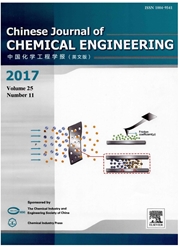

 中文摘要:
中文摘要:
超级批评的反溶剂( SAS )过程为 nano 的形成在最近的年里被开发了--并且 micro-particles.It 是必要的学习液相体积膨胀( LPVE )并且发现在操作条件和 LPVE 之间的关系以便为决定开发一个实际方法操作条件并且为 SAS 选择有机溶剂过程。有混合统治的 vdW-1 的状态的 PR 方程被用来推测当温度增加, LPVE forCO_2/toluene, CO_2/acetone 和 CO_2/ethyl 醋酸盐系统,和结果证明为每个 CO_2/organic 溶剂系统的 LPVE 减少。在 theLPVE 和在为 CO_2 /organic 溶剂系统的液相的 CO_2 的溶解度之间的关系被调查,并且结果证明 LPVE 由在液相, xCO_2,和罐头的 CO_2 的溶解度直接是坚定的独立地与 xCO_2 有关。不管溶剂是 CO_2/organic 的系统并且温度怎么不同,只要, LPVE 有小差别在液相的 CO_2 的溶解度, xCO_2,保持不变。低温对 SAS 过程总是有利。越高在在某些操作条件下面的有机溶剂的 CO_2 的溶解度,它越合适到 SAS 过程。
 英文摘要:
英文摘要:
The supercritical antisolvent (SAS) process has been developed in recent years for the tormation of nanoand micro-particles. It is necessary to study the liquid phase volume expansion (LPVE) and find the relationships between the operating conditions and the LPVE in order to develop a practical method for determining the operation conditions and selecting an organic solvent for SAS process. The PR equation of state with vdW-1 mixing rule is used to calculate the LPVE for CO2/toluene, CO2/acetone and CO2/ethyl acetate systems, and the results show that the LPVE for each CO2/organic solvent system decreases as the temperature increases. The relationship between the LPVE and the solubility of CO2 in the liquid phase for CO2/organic solvent systems is investigated, and the results show that the LPVE is determined directly by the solubility of CO2 in the liquid phase, xCO2, and can be related to xCO2 independently. No matter what system of CO2/organic solvent is and how different the temperature is, the LPVEs have little difference as long as the solubility of CO2 in the liquid phase, xCO2, keeps constant. The lower temperature is always favorable to the SAS process. The higher the solubility of CO2 in an organic solvent under certain operation condition, the more suitable it is to the SAS process.
 同期刊论文项目
同期刊论文项目
 同项目期刊论文
同项目期刊论文
 期刊信息
期刊信息
